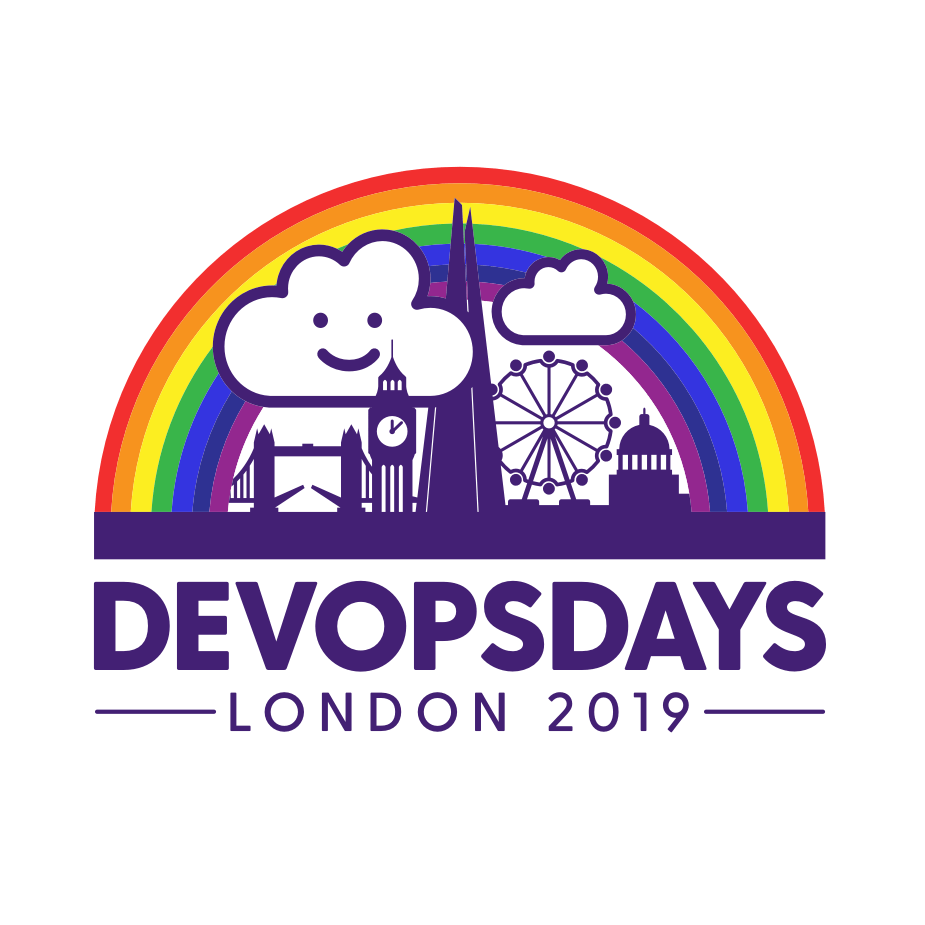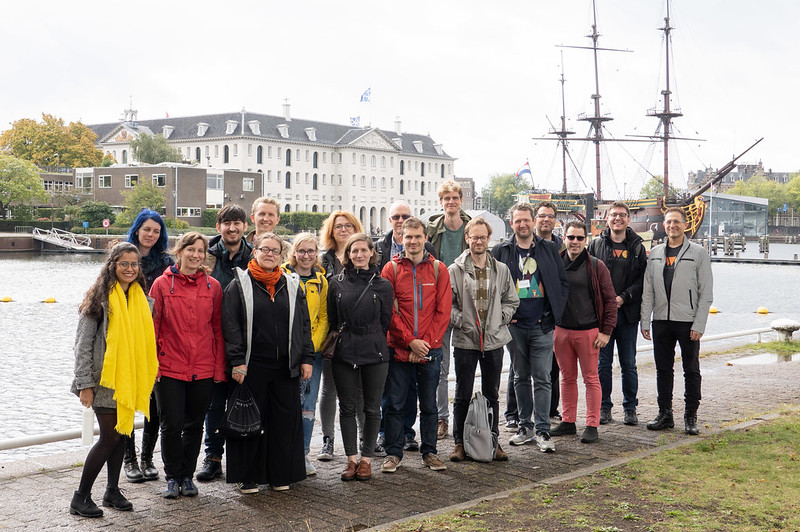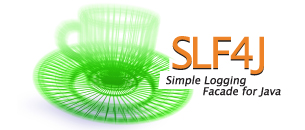This is a great resource for how to replace the term "guys" with an inclusive alternative
Dominique shared this at DevOpsDays London, and it's a really great idea.
Because it can be difficult attending meetups on your own, Dominique and co have set up a community that makes it possible to meet folks before a meetup, maybe have a drink and a chat, and then head over together.
It has made a huge difference to folks wanting to attend, and has given people a lower barrier to attending an event, because they'll be able to chat to others on Slack before they go, so it won't be as awkward.
This is something that Tech Nottingham and Women in Tech Nottingham do, where before the event there will be some folks meeting at the Theatre Royal, and then they can walk over together, getting a chance to meet others.
Several of the organisers in the Nottingham tech scene chatted with Dominique about this at DevOpsDays, and we'll be looking to see if we can roll it out in Nottingham, too.
Anna has started to use her /events/ page as a way to help others see what events she's attending and for others to join her, too, and I think I'm going to be copying her and doing similar to make it easier for folks to see what upcoming events I'm attending.
DevOpsDays London 2019 (63 mins read).

A writeup of the DevOpsDays London conference, and the talks and Open Spaces I attended.
Getting git diff Outputs Without a Prefix (1 mins read).

How to remove a/ and b/ from git diff outputs.
This is a really interesting post to hear how some other folks in a similar environment to us manage their secrets.
It's always cool to see how other folks are doing similar things, anyway, and as usual, Monzo have a great blog post.
Post details
October means it's time for Hacktoberfest. Hacktoberfest is an awesome event where you can get involved in open source whether it's your first time contributing or you're a seasoned pro. In this episode we'll discuss what Hacktoberfest is, how you can start contributing to open source, and with our

Moving Teams after Three Years (4 mins read).
Announcing my move between teams at Capital One, and looking back over three years in my previous team.
Diagnosing my Slow Netlify Deploy Times (2 mins read).

How I managed to shave off 7 minutes of my deploy time, (in true clickbait fashion) just by removing one line of code.
This is a great article on why we can't just let Google Chrome / Chromium take over the Web, and need to fight for other alternatives.
But as well as looking at the browsers, we need to look to the platforms too. If everyone ie uses Twitter, then Twitter are less likely to make changes because no one has an alternative. Whereas when we have multiple viable options, folks can jump around and use better platforms if they exist.
The IndieWeb is looking to do this - check out https://indieweb.org/why for a bit more info
Day trip to London tomorrow, so 4+ hours on the train - hoping to finish my writeup of DevOpsDays London as it was a great conference and I'd love to share it with y'all!
I guess you could say I'm officially a Go developer now that I've made this tiny contribution to Hugo! https://github.com/gohugoio/hugo/pull/6391
On Panic Attacks (3 mins read).
Remembering my first (and so far only) panic attack.
Had a very exciting end to the week.
I'm looking forward to sharing some news on Monday - keep an eye out for a blog post!
This is very good news - open standards like OpenID Connect (OIDC) make interoperability and integration easier, so hats off to Apple!
IndieWebCamp Amsterdam 2019 (19 mins read).

Recapping my time at IndieWebCamp Amsterdam, my first 'official' IndieWeb event, and meeting some of the big names in the community.
So very close to having my IWC Amsterdam blog post finished before WIT Notts - may have to see if I can get the last bit sorted before the talks start!
This is an interesting post, and is an important one to think about. We need to remember that although now we've got lax data privacy / retention laws, it's only going to get more user-focused and protect everyone more (which is universally a good thing!) but that we need to make sure we're architecting things in the right way to handle this.
Also, while you're thinking about this - have a read through some production logs and wonder "what could a bad actor do with these? Could they phish a customer? Could they steal their identity? Or are these so useless that we may as well not be logging anything at all?"
#Hacktoberfest PR #3 complete! https://github.com/phpminds/website/issues/136 - another productive #HomebrewWebsiteClub, and I even managed to support some other repos + get some stuff ready for maybe number 4
Completely agree with this, as a meetup organiser, and would go one step further to say if you're able to RSVP if you're not coming that'd help too, otherwise there's the assumption you'll turn up, especially if you're a regular!
I will not be attending
It's a shame as this sounds good, but it clashes with https://www.jvt.me/events/homebrew-website-club-nottingham/2019/10/16/ and as it's Hacktoberfest it's going to be pretty busy, methinks!
I will be attending
I will be attending
I will be attending
Auto-linking URLs with Hugo (2 mins read).

How to get URLs automagically converted to links in Hugo, using Regular Expressions.
This is an interesting read - I'm a big fan of TDD but a few things here hold true
I will not be attending
This would be cool, but don't think I'll be able to do two IndieWebCamps in a row, especially across the world!
I will not be attending
The POSSE to Twitter looks great! But unfortunately I won't be able to make it all that way
Nothing like a fire alarm when you're fast asleep to get the blood moving..
Proposing a Microformats2 Markup for Licensing Information (7 mins read).

Some recommendations for how to mark up licensing information with Microformats, for making license information machine-discoverable and machine-readable.
#10MoreBlogPosts sounds like a great initiative - hope that it'll help get more folks into blogging.
I've found it's really helped me personally since starting to work on blogumentation (blogging as a form of self-documentation https://www.jvt.me/posts/2017/06/25/blogumentation/ )
It's been an awesome day at IndieWebCamp Amsterdam!
The afternoon was chatting about licenses and ownership, then looking at how to migrate folks from silos to IndieWeb with a long term strategy, then some discussions about events, RSVPs and calendars, and finally all things syndication.
Got some great discussions, and lots of interesting things to play with tomorrow at the hack day!
Interesting start to the morning at IndieWebCamp Amsterdam - we've spoken about accessibility of the Web and IndieWeb, and about how private posts and privacy should work
I'm really enjoying the intros at IndieWebCamp Amsterdam. Its nice to see the range of websites, the technology usages, and that some folks are posting while they're talking while others haven't touched their sites in years.
It's an exciting chance to get reinvigorated!
I will be attending
En route to my first IndieWebCamp (Amsterdam) after a great couple of days at DevOpsDays London.
I'm really looking forward to meeting some folks and talking about owning more of my little corner of the Web, and meeting the faces behind the websites I frequent!
Yesterday I met someone who, after my talk Overengineering Your Personal Website at last year's DevOpsDays London, started building their own website. That's awesome! 🙌🏼
I will be attending
Post details
Listen to this episode from Rizamblings on Spotify. In which, I actually read you an essay. Plus, I dabble on final year of uni, what it means to be a perfectionist and salads that resemble some animals. A mixed bowl; as always. Don't forget to #RizambleAlong on Twitter, find me -> @rizbizkits

This is such an awesome touch, I think this may be entering my wish list!
Pushing your Git Branches to a Matching Remote Branch (1 mins read).

How to save yourself from typing git push --set-upstream origin ${branch} and have Git determine the branch you're pushing to.
Testing Your SLF4J Logs (2 mins read).

Looking at how we would unit test our SLF4J logs to gain confidence they work, and to catch regressions in the future.
Viewing Logs for a systemd Unit with journalctl (1 mins read).
How to view the logs for a given unit, using systemd and journalctl.
I will not be attending
But I also have some tweaks to make sure I render a title for /mf2/ entries, as currently search doesn't help as it's just an empty string returned for things that match
